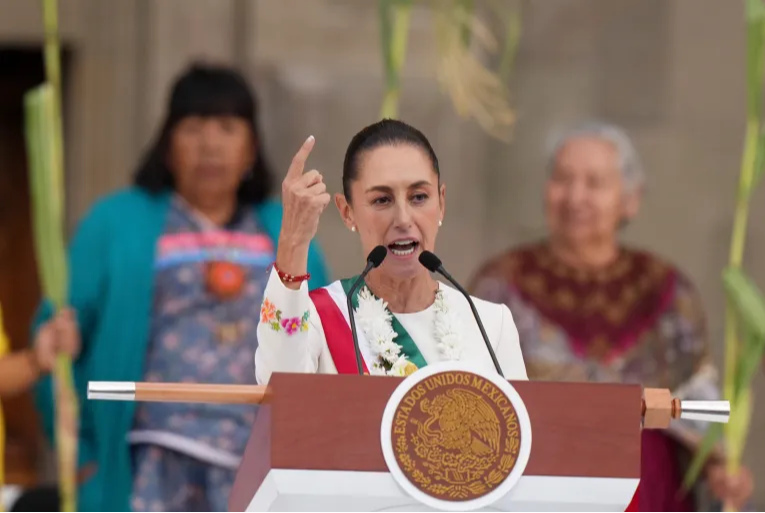
Mexico's President Claudia Sheinbaum has warned against Trump's proposed tariffs [Fernando Llano/AP Photo]
Mexico City, November 28 (RHC)-- Mexico’s president and economy minister have given the clearest picture yet of how their government will respond to United States President-elect Donald Trump’s proposed tariffs on the country, which their government has warned will cost 400,000 U.S. jobs.
Speaking at a news conference on Wednesday, Mexican President Claudia Sheinbaum said the Mexican response would be swift if Trump followed through on the plans.
“If there are U.S. tariffs, Mexico would also raise tariffs,” Sheinbaum said. The comments were the latest response to Trump’s statement on Monday that he plans to impose massive tariffs not just on China, but on Canada and Mexico as well, at a whopping 25-percent rate.
Economy Minister Marcelo Ebrard also warned against Trump starting a regional trade war, calling the cost to U.S. workers “huge.” “Around 400,000 jobs will be lost” in the Unite States, he said, pointing to a study based on figures from US carmakers that manufacture in Mexico.
He added the impact would extend beyond workers to US consumers. For example, Ebrard said, most pick-up trucks sold in the US are manufactured in Mexico. He claimed Trump’s tariffs would add $3,000 to the cost of a new vehicle.
“That is why we say that it would be a shot in the foot,” he said.
‘Unacceptable’
Trump has promised to use tariffs to bolster the US manufacturing industry – an attempt at a hard reset that economists have cast doubt on.
Still, the severity of the president-elect’s approach to Canada and Mexico, who along with China make up the U.S.’s top three trading partners, has come as somewhat of a surprise.
In his statement on Monday, Trump said he would impose the 25-percent tariffs if the three countries do not do more to address irregular migration and drug smuggling into the United States. Sheinbaum had previously called the threats “unacceptable”.
On Wednesday, Sheinbaum revealed she held a call with Trump to discuss migration across the U.S.-Mexico border, where she attempted to assuage his fears. “I had an excellent conversation with President Donald Trump,” Sheinbaum posted on social media. “We discussed Mexico’s strategy on the migrant phenomenon, and I shared that caravans are not arriving at the northern border because they are being taken care of in Mexico.”
Officials have also warned Trump’s tariffs likely run afoul of the free trade agreement between the U.S., Mexico and Canada, the USMCA, which prohibits most duties on trade between the three countries.
Trump himself had renegotiated the agreement during his first term, complaining that U.S. businesses were getting a raw deal.
Sheinbaum has requested a meeting with Trump before he takes office on January 20th.
For his part, Canadian Prime Minister Justin Trudeau said he had already spoken with Trump about the tariff threat, stressing the longstanding ties between the two countries.
“We talked about some of the challenges that we can work on together. It was a good call,” he said. “This is a relationship that we know takes a certain amount of working on, and that’s what we’ll do.”
Government officials have not been the only ones who have warned of the impact of the proposed tariffs on US companies and consumers. Analysts at Barclays have said they estimate the proposed tariffs “could wipe out effectively all profits” from the “Detroit Three” automakers: GM, Stellantis and Ford.
“While it’s generally understood that a blanket 25 percent tariff on any vehicles or content from Mexico or Canada could be disruptive, investors under-appreciate how disruptive this could be,” they wrote in a note on Tuesday.
Trump’s team, for its part, has remained defiant. Brian Hughes, a spokesperson for Trump’s transition team, told the Reuters news agency the tariffs would protect US manufacturers and workers from “unfair practices of foreign companies and foreign markets”.
He contended Trump would implement policies he said would make life affordable and more prosperous for the United States -- which, of course, is always first.

